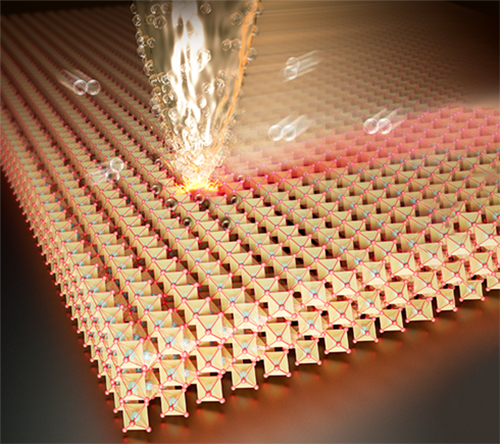Chinese scholars make progress in the study of insulator-metal transition in materials
Supported by the National Natural Science Foundation of China (Grant No. 51788104, 52025024, and 51872155), a research group led by Prof. Pu Yu and Prof. Ce-wen Nan from Tsinghua University and associate research fellow Linglong Li from Southeast University has achieved important progress in the study of manipulating the insulator-metal transition through tip-induced hydrogenation at the nanoscale. The research result was published in Nature Materials on September 29, 2022, with the title "Manipulating the insulator-metal transition through tip-induced hydrogenation ". (article link: https://www.nature.com/articles/s41563-022-01373-4).
Strongly correlated oxide materials have numerous interesting physical properties, among which the insulator-metal transition has received much attention due to the presence of conductivity changes spanning several orders of magnitude. Using electric field to manipulate this phase transition is of great importance for realizing functional applications such as resistive switching memories and smart windows. In recent years, hydrogen ion has been widely employed during the modulation of material properties, particularly due to its fast migration and high feasibility under the electric field. Through the incorporation and extraction of hydrogen ions driven by an electric field, a series of interesting phenomena (e. g., emergent magnetism, improved superconductivity, and insulator-metal transition) were successfully obtained. However, the conventional strategies (ionic liquid gating, solid ionic gating, etc.) of ionic modulation face fundamental limitations of complicated device architecture and slow switching speed, which hinder the device miniaturization and practical applications.
The research team from Tsinghua University and Southeast University creatively employed platinum-coated scanning probes to trigger the hydrogen splitting reaction from the hydrogen gas environments; while the positively biased voltage facilitates the hydrogen ion incorporation into the sample, leading to a non-volatile transformation from insulating VO2 into conducting HxVO2 phase. Furthermore, they found that the negatively biased voltage successfully triggers an efficient dehydrogenation process to restore the insulating VO2. Therefore, a nanoscale and reversible control of insulator to metal transition is realized. Compared with the previously demonstrated ionic liquid gating induced ionic evolution from the same group at Tsinghua University (Nature 546, 124, 2017, etc.), the biased voltage at the probe effectively reduces the surface intercalation energy barrier, therefore leading to a much faster switching speed than conventional ionic modulation methods. This novel protonic modulation approach should be compatible with a wide collection of functional materials, such as oxides, two-dimensional materials, superconducting materials, and others, offering a generic pathway to manipulate the electronic states and functional properties of materials.

Figure. Schematic for manipulating the insulator-metal transition through tip-induced hydrogenation.
Contact Us

National Natural Science Foundation of China
Add: 83 Shuangqing Rd., Haidian District, Beijing, China
Postcode: 100085
Tel: 86-10-62327001
Fax: 86-10-62327004
E-mail: bic@nsfc.gov.cn
